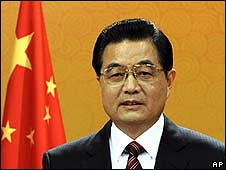
President and CPC Chairman of the People's Republic of China, Hu Jintao, has visited Africa and pledged greater cooperation between the PRC and the continent. The PRC maintains good relations with the Republic of South Africa.
Originally uploaded by Pan-African News Wire File Photos
By Geoff Dyer in Beijing
July 9 2010 19:47
Google said on Friday that Beijing had renewed its operating licence, surprising many in the industry who had not expected the Chinese government to compromise in its censorship dispute with the US internet group.
The development came after a six-month standoff provoked by Google, which had initially stirred a hardline response by declaring that it would end its four-year-old agreement requiring it to censor Chinese searches.
While the news was welcomed by China experts in the US, who described it as a face-saving and pragmatic compromise, industry observers also warned that China might now progressively limit access to Google’s services.
In two lines of text posted on its own blog, Google said that the renewal of its internet content provider licence would allow it to continue providing “web search and local products to our users in China”.
The announcement means that Google can keep operating its google.cn website and removes the immediate threat that the US group would have to withdraw completely from the Chinese market, the world’s largest, with 400m users.
Turbulent times
● 2000 Google begins offering a Chinese-language version of Google.com
● January 2006 Google.cn is launched amid widespread criticism. Google agrees to block certain websites in return for being able to run a local Chinese service. The unfiltered Chinese-language Google.com is available
● June 2006 Google.com blocked in China, while Google.cn continues to work
● September 2007 Google.cn receives a licence from Beijing, allowing it to officially operate in China
● January 2009 Chinese regulators criticise Google for making pornography available in its search
● June 2009 Chinese regulators “punish” Google China for failing to remove pornographic content from search results, including a suspension of its ability to search foreign websites
● January 2010 Google says it will end censorship of its search service in China and is prepared to pull out of the market
● March 2010 Google announces it has stopped censoring its search services on its local Chinese service. All search requests on Google.cn are now being redirected to Hong Kong arm
● June 2010 Beijing threatens to shut it down by the end of June
Google’s announcement in January that it would stop complying with the censors set up a rare public showdown between a multinational company and Beijing.
The US group’s initial solution was to automatically redirect users of google.cn to its Hong Kong website, which operates outside of mainland Chinese restrictions. However, in late June, David Drummond, Google’s chief legal officer, said that Beijing had deemed the redirect “unacceptable”.
Google’s new arrangement is to send mainland users to a a landing page from which they can click on a link to the Hong Kong website. Although this means that Chinese users only have to click one more time to be redirected, the approach appears to have won the approval of the Chinese authorities for the time being.
Kenneth Lieberthal, of the Brookings Institution, the Washington-based public policy group, said that the compromise reflected a change of stance by the Chinese authorities. Both sides had found a face-saving solution, he said: “Google is no longer the enforcer of censorship – China is.”
Even with the renewed licence, Google could still encounter problems, including slow access to its websites or the complete blocking of google.com. Local internet users can access the company’s US website, but searches on sensitive subjects are censored by the Chinese themselves.
“The big thing for Google is that this takes away a lot of the uncertainty, which will allow them to sell advertising and do many other things,” said Duncan Clark, of BDA China, a Beijing-based technology consultancy. “But it is still not clear yet what the commercial impact will be of moving from one-click to two-clicks.”
Chinese officials were unavailable for comment.
No comments:
Post a Comment